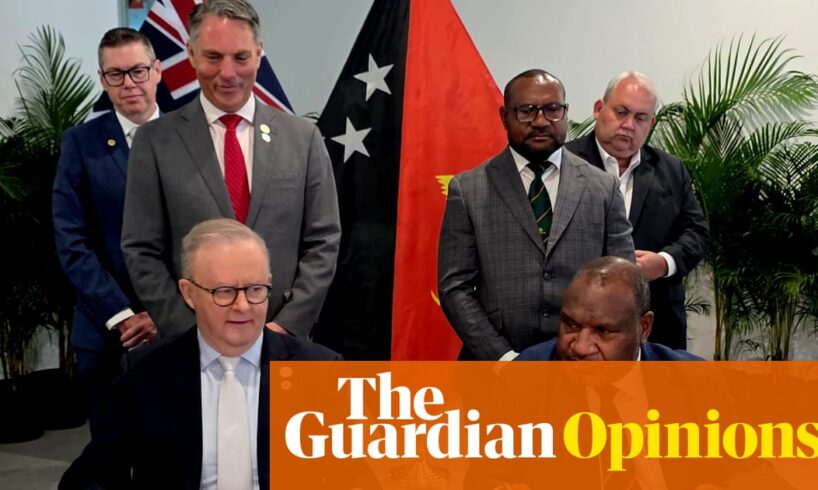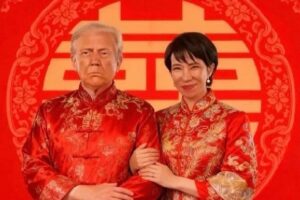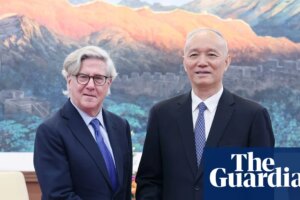
Anthony Albanese’s 10 days in the Pacific have been less than stellar.
Last week, he could not land a $500m economic and security agreement with Vanuatu, the second such rebuff from Vanuatu in as many years. The idea that Australia should exercise veto rights over Vanuatu’s relationship with third parties (which is code for China) did not strike its advocates as a bridge too far. Just a month ago, Australian ministers initialled the Nakamal agreement, apparently unaware of the opposition and resentment within both government and opposition ranks in Port Vila.
This week, he could not land an even more ambitious defence treaty with Papua New Guinea that would have seen the virtual integration of the defence forces of PNG and Australia in mutual defence. Who the aggressor might be was not mentioned of course, though China loomed large in media reporting. Again, no one seems to have been aware of the opposition and resentment within the PNG parliament.
The foreign minister’s explanation for the collapse of the Vanuatu deal was the “permanent contest” with China for influence in the Pacific. Penny Wong said Australia had lost the opportunity to be the only partner of choice in the Pacific, now working instead to be the partner of choice in our own interests. Whether it is in Australia’s interests to be in a permanent competition with China in the Pacific is arguable.
Notwithstanding his earlier announcement that the PNG defence treaty would be signed, the prime minister’s explanation for the collapse of the PNG deal was essentially that democracies are not the same as authoritarian regimes because they go through processes which Australia respects. Essentially, it was a matter of insufficient time for due process.
Sign up: AU Breaking News email
That is an extraordinary admission. If diplomacy is not an enterprise demanding intelligence and tact and a respect for process, what on earth is it?
This double whammy in the Pacific is a failure of diplomacy. But the failure of diplomacy is symptomatic of a much deeper set of systemic failures: a failure of mindset; a failure of policy; and, critically, a failure to appreciate the cultural, political and social dynamics of the Pacific.
Australia’s default foreign policy mindset is a function of two factors: dependence on America and fear of China.
We see everything through the lens of our relationship with America. As the defence minister continues to pronounce, the US alliance is the “cornerstone” of both our defence and foreign policies. It is no accident that the prime minister was seeking to stitch up the two treaties in the Pacific before he meets Donald Trump, possibly on the margins of the UN General Assembly later this month.
Our ingrained fear of China dominates the way we think about both Asia and the Pacific. Our dependence on the US is a function of our fear of China. These related concerns thread their way through almost every foreign policy issue, whether it is our inability to criticise America’s bombing of nuclear facilities in Iran or Israel’s bombing of the people and the civilian infrastructure of the Gaza Strip.
The policy failure is quite simply gobsmacking.
Policy is pretty easy to understand. It consists of and elaborates the principles on which decisions are taken. But policy is hard to do, because it deals with the complex interrelationships between values, interests, needs, expectations and resources. So good policy ensures that the right people make the right decisions at the right time, generating effective and equitable outcomes.
It would appear that the politicians in Port Vila and Port Moresby made the right decisions, because they acted in their own interests by refusing to give Australia veto powers over the conduct of their foreign and security policy. They preserved their sovereignty.
skip past newsletter promotion
Sign up to Breaking News Australia
Get the most important news as it breaks
Privacy Notice: Newsletters may contain information about charities, online ads, and content funded by outside parties. If you do not have an account, we will create a guest account for you on theguardian.com to send you this newsletter. You can complete full registration at any time. For more information about how we use your data see our Privacy Policy. We use Google reCaptcha to protect our website and the Google Privacy Policy and Terms of Service apply.
after newsletter promotion
Australia’s politicians did not make the right decisions, because they sought to confine these two Pacific countries within Australia’s strategic imperatives without acknowledging that theirs might well be different.
This reflects the most fundamental failure of all – Australia’s inability and unwillingness to understand the communities of the Pacific and the way they do business. We are often seen in the Pacific, including by our friends in New Zealand, as arrogant, condescending and patronising, quick to lecture and slow to listen.
This fundamental failure is the consequences of decades of less-than-benign neglect, where we have shown tough love to peoples we like to talk down to as “our Pacific family”. We are deaf to the entreaties of Pacific countries that we address the causes of global warming (mitigation), not just its consequences (adaptation), just as we drive hard bargains in affording them access to the Australian economy.
If the Albanese government is capable of learning anything from its week-and-a-bit in the Pacific, it should be this: human security is the issue that really matters in the Pacific. Australia needs to understand that the Pacific nations might not want to be Australia’s partners of choice in the battle of the giants. They want wellbeing and happiness.
Allan Behm is special advisor, international and security program, at the Australia Institute, Canberra





